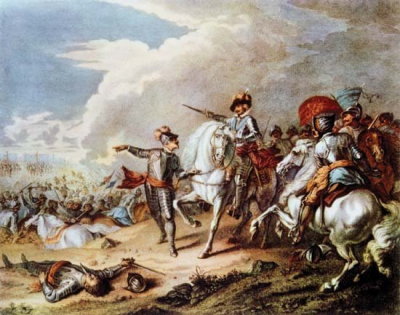The Battle of Marston Moor was fought on 2 July 1644, during the Wars of the Three Kingdoms of 1639 1653. The combined forces of the English Parliamentarians under Lord Fairfax and the Earl of Manchester and the Scottish Covenanters under the Earl of Leven defeated the Royalists commanded by Prince Rupert of the Rhine and the Marquess of Newcastle.
During the summer of 1644, the Covenanters and Parliamentarians had been besieging York, which was defended by the Marquess of Newcastle. Rupert had gathered an army which marched through the northwest of England, gathering reinforcements and fresh recruits on the way, and across the Pennines to relieve the city. The convergence of these forces made the ensuing battle the largest of the civil wars.
On 1 July, Rupert outmanoeuvered the Covenanters and Parliamentarians to relieve the city. The next day, he sought battle with them even though he was outnumbered. He was dissuaded from attacking immediately and during the day both sides gathered their full strength on Marston Moor, an expanse of wild meadow west of York. Towards evening, the Covenanters and Parliamentarians themselves launched a surprise attack. After a confused fight lasting two hours, Parliamentarian cavalry under Oliver Cromwell routed the Royalist cavalry from the field and, with Leven's infantry, annihilated the remaining Royalist infantry.
After their defeat the Royalists effectively abandoned Northern England, losing much of the manpower from the northern counties of England (which were strongly Royalist in sympathy) and also losing access to the European continent through the ports on the North Sea coast. Although they partially retrieved their fortunes with victories later in the year in Southern England, the loss of the north was to prove a fatal handicap the next year, when they tried unsuccessfully to link up with the Scottish Royalists under the Marquess of Montrose.
The English Civil War (1642–1651) was a series of civil wars and political machinations between Parliamentarians ("Roundheads") and Royalists ("Cavaliers"), mainly over the manner of England's governance and issues of religious freedom. It was part of the wider Wars of the Three Kingdoms. The first (1642–1646) and second (1648–1649) wars pitted the supporters of King Charles I against the supporters of the Long Parliament, while the third (1649–1651) saw fighting between supporters of King Charles II and supporters of the Rump Parliament. The wars also involved the Scottish Covenanters and Irish Confederates. The war ended with Parliamentarian victory at the Battle of Worcester on 3 September 1651.
Unlike other civil wars in England, which were mainly fought over who should rule, these conflicts were also concerned with how the three Kingdoms of England, Scotland and Ireland should be governed. The outcome was threefold: the trial and the execution of Charles I (1649); the exile of his son, Charles II (1651); and the replacement of English monarchy with the Commonwealth of England, which from 1653 (as the Commonwealth of England, Scotland, and Ireland) unified the British Isles under the personal rule of Oliver Cromwell (1653–1658) and briefly his son Richard (1658–1659). In England, the monopoly of the Church of England on Christian worship was ended, and in Ireland, the victors consolidated the established Protestant Ascendancy. Constitutionally, the outcome of the wars established the precedent that an English monarch cannot govern without Parliament's consent, though the idea of Parliamentary sovereignty was legally established only as part of the Glorious Revolution in 1688.

1644Jul, 2
English Civil War: Battle of Marston Moor.
Choose Another Date
Events on 1644
- 18Mar
Colony of Virginia
The Third Anglo-Powhatan War begins in the Colony of Virginia. - 25May
Wu Sangui
Ming general Wu Sangui forms an alliance with the invading Manchus and opens the gates of the Great Wall of China at Shanhaiguan pass, letting the Manchus through towards the capital Beijing. - 27May
Battle of Shanhai Pass
Manchu regent Dorgon defeats rebel leader Li Zicheng of the Shun dynasty at the Battle of Shanhai Pass, allowing the Manchus to enter and conquer the capital city of Beijing. - 6Jun
Shunzhi Emperor
The Qing dynasty Manchu forces led by the Shunzhi Emperor capture Beijing during the collapse of the Ming dynasty. - 2Jul
Battle of Marston Moor
English Civil War: Battle of Marston Moor.

 English
English  español
español  français
français  português
português  русский
русский  العربية
العربية  简体中文
简体中文 